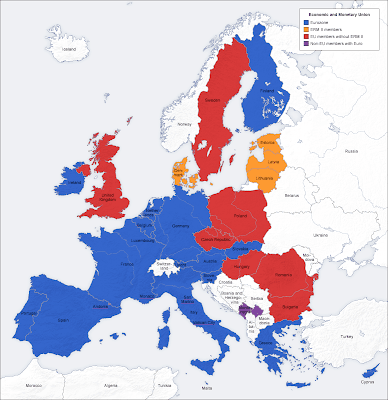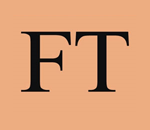The European Union
Established in 1993
27 member states
16 member states participate in the Euro
500 million citizens
30% of Gross World Product
The EU began as an alliance at the Schuman Treaty of 1950, a coal and steel trade agreement with Belgium, France, Italy, Luxembourg, Netherlands & West Germany.
In 1957, the same core countries signed the Treaty of Rome which continued to be revised until the official EU formation in 1993. We now have an “enlarged Europe” because it has come to include the Eastern countries.
Blue indicates the member states that use the Euro currency.
The UK retains their original currency. Non-member states Norway, Switzerland and Lichtenstein participate only in “single market” for leveling of prices. Iceland participates in single market but has now requested to join.
Fredrik Reinfeldt, b. 1965, Prime Minister of Sweden and President of the EU
The presidency rotates twice a year and is currently held by Sweden. The actual constitution has never been accepted because it was refused by France and the Dutch.
Within the EU are the following agencies
The European Parliament: works to pass legislation
The European Council: advises Parliament and controls the “Common Foreign and Security Policy”
The European Commission: initiates the legislation
The European Court of Justice: upholds the legislation
The EU executive body the “European Commission” enforces laws but it is up to each country to regulate media.
Burton, Cathie & Drake, Alan (2004). The European Media Landscape in Hitting the Headlines in Europe.
The European news system began with Roman posting of flyers and the first newspaper the Acta Diurna, meaning “daily acts.” Acta Diurna introduced the expression “publicare et propagare”, which means "make public and propagate." This expression was set in the end of the texts and proclaimed a release to both Roman citizens and non-citizens. Their original content included results of legal proceedings and outcomes of trials. Later the content was expanded to public notices and announcements of prominent births, marriages and deaths.
The first newsprint was in Nuremberg Germany in 1457, followed by Britain’s paper The Weekly News in 1622. While the ruling class tried to contain newspapers to the educated, by the 19thcentury it was a main, relatively popular form of communication amongst the literate.
Contemporary Europe now has both nation and language specific news. There is only 30% fluency in English as of 2001, with Russian being the most spoken native and second language in Europe at 288 million speakers.
European News Media
The Financial Times
Since 1888, British pink paper the supplies facts and stories about the economic climate. It is known for remaining fairly neutral with some British Labour party support.

The International Herald Tribune
Based in Paris, it works in relationship to it’s owner the New York Times.
The Economist
A Scottish founded free market magazine published in 6 different country editions. It is known for being on the right, conservative side but is at times unpredictably radical. Importantly all the stories are anonymously.

Le Monde
The newspaper has a 2 million daily readership, larger than the New York Times. It is available in 120 countries in French.
European News Agencies
Reuters
Reuters started in Britain by carrier pigeons, then underground cables. It is now the most subscribed news source for European newspapers.
Agence France Press
16 Europeans offices with 2,000 writers. Circulates news in Europe in 7 languages
Associated Press
American based with about 250 world wide offices
Itar Tass
The former Soviet News agency now serving Russia and Eastern Europe
European News Channels
BBC World
While BBC in England is regulated public television, BBC World has advertising.
CNN
The European office is located in London. The French correspondant is AUP Professor Jim Bitterman.
Deutsche Welle
World news in German and English with some Spanish and Arabic languages for specific markets.
Euronews
Based in Lyon France, 7 language broadcast in voiceover only, currently the global leader
A combined French-German station that also reaches Austria, Belgium and Switzerland.

CNBC Europe
American NBC dependent news source targeting banks and hotels
European Media Centers
Brussels: Global politics happens here. Headquarters for the EU and NATO (North Atlantic Treaty Organization) and near the International Criminal Court in the Hague.
London: Leader in global news and center for the Foreign Press Association.
Paris: Claims largest number of foreign correspondents
Strasbourg: The European Parliament, the legislative branch of the EU, meets here and there are many human rights agencies and other offices based here.
Geneva: Home to the United Nations, World Trade Organization and Red Cross




























No comments:
Post a Comment